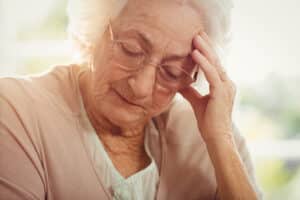While migraines are not as common in the elderly as they are in younger populations, some migraine sufferers, unfortunately, continue to struggle with migraines well into their senior years and need to continue to manage the debilitating symptoms that they bring with them. Hiring a home care provider can help a loved one manage their needs so they can focus on how they deal with their migraines.
Migraine Symptoms in the Elderly

Everyone’s migraines can be a little different, but some symptoms that most migraine sufferers struggle with include:
- A strong throbbing headache that will throb with each contraction of the blood vessels.
- Most migraines usually affect just one side of the head at a time.
- Nausea or vomiting can accompany some migraines when they are especially strong.
- Bright light, strong smells, and certain motions such as bending over or walking can make them worse.
- Visual disturbances can occur alongside the headache. The sufferer may see floaters, bright flashes of light, and/or excessive light.
As an elderly person, if your loved one’s typical migraine has any of these changes to normal symptoms or additions to the normal symptoms, she should seek immediate medical help:
- A headache that comes on much quicker than before or feels strangely stronger.
- A migraine that results in violent vomiting or nausea, especially if that wasn’t a common symptom in the past.
- A migraine that is accompanied by extreme arm or leg weakness, a drooping mouth, or difficulty speaking.
- A migraine that continues to escalate in intensity.
Migraine Care for the Elderly
While standard care practices will help your loved one manage her migraines like she always has, there are some extra care steps to be followed to ensure that her migraines don’t lead to more serious complications.
Preventing Falls During a Migraine
As an elderly person, your loved one may already struggle with an increased risk of falling due to other health issue that occurs with aging, such as weakened muscles, osteoporosis, or cognitive issues such as dementia. Because of the increased risk of falls, some of the standard care techniques for migraines need to be adjusted.
While a dark room is ideal for many migraine sufferers to find relief, make sure your loved one’s room of retreat doesn’t present any tripping hazards as she finds her way through a darkened area to her resting place. Having a room or area in the home that’s consistently kept neat and clean with a small nightlight can make sure she has what she needs when she needs it.
Another possible concern for those with migraines is the way light affects vision during an attack. Your loved one may not want to open her eyes because light causes pain, or she might have visual disturbances that create an unclear visual path in front of her. Both of these can increase the risk that she’ll not see an item on the floor that she could trip over.
Rushing to the bathroom if nausea occurs is another migraine event that can increase the risk of tripping and falling.
Proactively Creating a Safe Migraine Environment with Home Care
Some migraines are regular, while others come out of nowhere. Having your loved one’s home neat and orderly can help her safely self-treat her migraine without fear of hurting herself as she navigates her home during a migraine. A home care team that regularly visits can help keep her home tidy and remove tripping hazards. The home care team can also assist during a longer migraine by helping with pet care needs, preparing meals, and transportation needs.
If you or an aging loved one is considering Home Care Services in Boynton Beach, FL, please contact the caring staff at Star Multi Care today. Call 954-962-0926.
Star Multi Care is a Trusted Home Care Agency in Florida, including Palm Beach, Miami-Dade, and Broward County.
- Managing Migraines in the Elderly - April 30, 2025
- Honoring Our Team: Birthdays, Anniversaries, and New Additions! - April 28, 2025
- Helping Seniors Embrace Support - April 24, 2025

